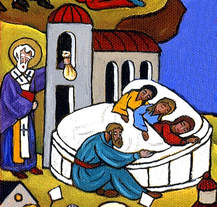|
There exist people who plan for you to be poor. However, involuntary poverty is not the subject of my rambling today. Rather, I will talk about my insane intention to earn what money I can but give it to the needy rather than to the greedy. Perhaps you continue reading due to morbid curiosity, to cite me as a cautionary example to your children. Please realize that there exist many like me who plan their own poverty. We are unseen and unheard, for we live under directives to not brag, to not even dwell on our own giving. “When you give to the needy, do not let your left hand know what your right hand is doing.” This stealth principle opposes giving to impress people, to earn points with God, or compensate for guilt. We begin from gratitude, looking back to what God has already given: "Freely you have received, freely give." We live in alert compassion: "I may give away everything I have,... but I gain nothing if I do not have love." We look forward with trust that, “God will supply all your needs.” With these attitudes and a live example or two, generosity naturally flourishes. That is why “God loves a cheerful giver," for that giver "is like a tree planted by a river, producing fruit in season, and its leaves don’t die."  By planned poverty, I do not mean throwing money out the window, but investing prayerfully, wisely, and generously in other people. Like Saint Nicholas, we throw money in through a window, to where it will do good. Generosity without wisdom can harm more than help, so I consider what needy persons really need--or trust them to decide better than I would. I adjust priorities. I avoid teaching helplessness. “If anyone is not willing to work, let him not eat,” sometimes applies, but not to the addled, the incapacitated, and four-year-olds. Indeed, by planned poverty, I mean budgeting both money and time to keep your family healthy and enlightened while as much as possible doing that for other families. “Live simply, that others may simply live.” Jesus slammed people who shorted their families: “Moses said, ‘Honor your father and your mother,’ … But you say a person can tell his father or mother, ‘I have something I could use to help you, but it is a gift to God.’ … You are rejecting what God said.” Planned poverty is a skill I continue to learn. Helping my effort, the people who are called into God’s kingdom function a little like a mutual funds broker, expertly redistributing gifts into a diversified portfolio of benevolence. But these people are more like a school for gaining smart compassion and encouraging intelligent trust. It’s no surprise that generosity emerges when you first give yourself. Footnotes: I am indebted to Roy Weece for the term "Planned Poverty", an idea he taught and lived. Like many skills, Planned Poverty improves not just with pondering and practice, but also with examples and mentoring. One such example is sketched in the follow-up post, "Remembering Mrs. Thurston".
0 Comments
Leave a Reply. |
Our Writers:At The Surge we love doing things together... that includes writing a blog! Here are a few of our main contributing authors: Greg JohnsonJesus++ Dwaine DarrahOur fearless leader, Dwaine is the lead pastor at The Surge. His experience in counter terrorism with the CIA prepared him for ministry and he likes dogs and babies even more than E does. EE (short for Eric Reiss) is the Wingman at The Surge and likes dogs, music, Mexican food, his wife Karen and his little girl Evangeline... not necessarily in that order. Archives
June 2024
Categories
All
|
|
|
The Surge Community Church
Meeting Sunday Mornings at The State Theatre in Falls Church, 11:10am! Rebroadcast Available Sunday Evenings with SurgeOnDemand, 7:00pm! |

 RSS Feed
RSS Feed
